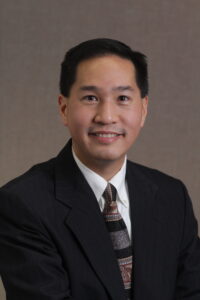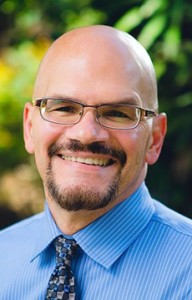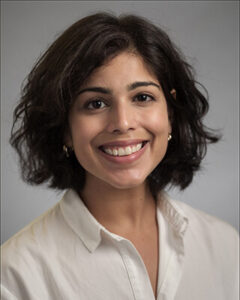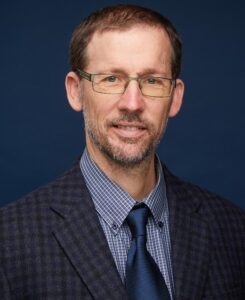CCSN 2024 SUMMER WORKSHOPS and CONFERENCES in Communication. Eleven (11) events total, beginning June 5 and ending July 23. We hope to see you there!
1. Registration is now open.
2. Format: All workshops are offered in the virtual environment through Zoom and are from 11:30 am – 3:00 pm EDT. Recordings of each workshop are available. Contact rwoods@theccsn.com if you want to gain access to a recording.
3. Free and discounted books are offered through all events.
4. Student discounts available for all 11 events. (Promo Code: STUDENT)
5. Summer passes to cover all 11 events are available. LEARN MORE
6. Group and institutional summer passes and discounts for all 11 event are available. LEARN MORE
7. Sponsorships for all events are available, which provide you with time in the schedule to share about your program or organization or latest initiative. Please contact rwoods@theccsn.com if you have questions.
8. Kristos Logos Paideia Undergraduate Honor Society members can attend all workshops for free (a total savings of $260.00). Contact Director Brandon Knight (BKnight@wmcarey.edu) for details on how to access all summer events if you are a KLP member. To join the Honor Society, visit https://www.theccsn.com/kristos-logos-paideia-honor-society/
9. Society of Christian Scholars members. The suggested registration fee is listed along with each event below. To request an alternate fee, contact rwoods@theccsn.com
If you have any questions, please don’t hesitate to reach out to the CCSN’s Executive Director, Robert Woods (rwoods@theccsn.com).
Sincerely,
Robert Woods
CCSN Executive Director
No. 1
Teaching C. S. Lewis: Chronicles of a Master Communicator
Presenter/Facilitator: Steven A. Beebe, Professor Emeritus of Communication Studies, Texas State University
Date/Time: Wednesday, June 5, 2024 | 11:30 am – 3:00 pm EDT
Description: Steven A. Beebe has been teaching his course “C. S. Lewis: Chronicles of a Master Communicator” at both Texas State University and Oxford University since 2005. Drawing upon his teaching experience, this seminar presents strategies, examples, and suggestions for teaching communication principles and practices inspired by C. S. Lewis. Based on the communication principles presented in Dr. Beebe’s recently published book, C. S. Lewis and the Craft of Communication, this workshop offers practical approaches for including Lewis’s ideas about communication in your course, whether you are teaching Lewis from a communication, theological, or literary perspective. Learn why Lewis was a master communicator as well as how to be a master educator about C. S. Lewis’s craft of communication. This interactive seminar includes opportunities for questions and discussion. Whether you are developing your first course about C. S. Lewis or are looking for ways to freshen an existing course, the seminar offers new insights about C. S. Lewis’s communication principles and practices.
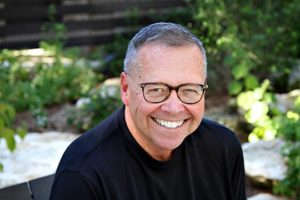 Steven A. Beebe (PhD, University of Missouri-Columbia) is Regents’ and University Distinguished Professor Emeritus of Communication Studies at Texas State University. He served as Chair of his department at Texas State for 28 years and concurrently as Associate Dean of the College of Fine Arts and Communication for 25 years. Prior to joining the faculty at Texas State, he was a tenured member of the Communication faculty at the University of Miami for 10 years. He is author and co-author of fourteen books (with editions totaling more than 75 books) that have been used at hundreds of colleges and universities (including international, Canadian, Russian, and Chinese editions) by several million students throughout the world. Steve’s research focuses on instructional communication and communication skill development. He is former president of the National Communication Association. His recent book, C. S. Lewis and the Craft of Communication (Peter Lang, 2020) reveals five communication principles that explain Lewis’s success as a communicator. Beebe made international headlines when conducting research at Oxford University when he discovered an unpublished manuscript written by C. S. Lewis that was the partial opening chapter of a book that was to be co-authored with J. R. R. Tolkien called Language and Human Nature. In 2016 and 2019 he also discovered unknown and unpublished poems by Lewis in the Oxford University Bodleian Library. Connect with Steven here: https://www.commstudies.txstate.edu/people/faculty/beebe.html
Steven A. Beebe (PhD, University of Missouri-Columbia) is Regents’ and University Distinguished Professor Emeritus of Communication Studies at Texas State University. He served as Chair of his department at Texas State for 28 years and concurrently as Associate Dean of the College of Fine Arts and Communication for 25 years. Prior to joining the faculty at Texas State, he was a tenured member of the Communication faculty at the University of Miami for 10 years. He is author and co-author of fourteen books (with editions totaling more than 75 books) that have been used at hundreds of colleges and universities (including international, Canadian, Russian, and Chinese editions) by several million students throughout the world. Steve’s research focuses on instructional communication and communication skill development. He is former president of the National Communication Association. His recent book, C. S. Lewis and the Craft of Communication (Peter Lang, 2020) reveals five communication principles that explain Lewis’s success as a communicator. Beebe made international headlines when conducting research at Oxford University when he discovered an unpublished manuscript written by C. S. Lewis that was the partial opening chapter of a book that was to be co-authored with J. R. R. Tolkien called Language and Human Nature. In 2016 and 2019 he also discovered unknown and unpublished poems by Lewis in the Oxford University Bodleian Library. Connect with Steven here: https://www.commstudies.txstate.edu/people/faculty/beebe.html
Registration Fee: $50.00
No. 2
Human and Machine … in the Age of Artificial Intelligence: Exploring Faithful and Faith-filled Social Interaction in a Shifting Media Landscape
Sponsored by: Trinity Western University (twu.ca) and the School of Arts, Media + Culture; and the Christianity and Communication Studies Network (theccsn.com)
Host: Robert Woods, Executive Director, Christianity and Communication Studies Network; Visiting Scholar, Trinity Western University
Lead Facilitators: Kevin Schut, Trinity Western University; Scott Macklin, Trinity Western University
Keynote Presenters: Derek Schuurman, Calvin University; Chase Mitchell, East Tennessee State University
Date/Time: Friday, June 7, 2024 | 11:30 am–3:00 pm EDT
Description: A Christian faith-infused, transdisciplinary conversation that aims to explore the implications of Artificial Intelligence (AI) in all segments of public and private life. The unconference features keynote speakers and round-table discussions that will engage participants in thought-provoking conversations and inspiring reflections. As an unconference, the focus will be on unscripted, informal exchanges in small groups that revolve around topics of shared interest. The event will serve as a platform for sharing research, experiences, and practical applications related to AI in the realms of art, music, business, education, science, and more. It will foster collaboration among scholars and practitioners interested in exploring the intersections of Christianity, technology, and various disciplines. Finally, this year’s encounter will serve as a generative mechanism to produce a transmedia suite of artifacts (e.g., a book, podcasts, videos, framing guides, etc.)
In today’s rapidly advancing technological landscape, AI has emerged as a transformative force with unprecedented benefits and opportunities to amplify human flourishing in almost every area of life. At the same time, AI’s structures and ideological biases present numerous pitfalls for misuse and injustice in areas such as politics, law, religion, medicine, and financial markets, to name several. And while concerns about AI’s impact on responsible civic engagement and public discourse are important, equally important is how AI can undermine human dignity and virtue, including critical challenges to privacy and self-determination.
Meanwhile, AI and its digital counterparts are driven by a “religion of technological optimism” which privileges strident individualism over moral responsibility and elevates technical skill over non-instrumental virtues such as humility, moderation, stewardship, justice, and authenticity. Not surprisingly, this techno-minded worldview fosters a messianic belief in technological advancement as the path to societal progress and personal happiness.
In light of these and other challenges, as faithful critics and caretakers we need to avoid the tendency to let our conversations about digital culture and AI devolve into debates between celebrants and skeptics. A hopeful critique must avoid the celebratory, naïve, and idolatrous assumption that human flourishing will arise naturally from any established political-technological-economic system. On the other hand, we cannot fall into cynical despair or embrace a dystopian fear that AI is taking us all to hell in a handbasket.
As Christians, we joyfully celebrate all benefits the tools of communication afford as part of God’s wondrous gifts of creation. At the same time, because these tools are formed from the earth’s resources and human design, they suffer the effects of humanity’s fall into sin. We thus recognize the importance of faith-filled responses to AI that integrate a biblical worldview and include questions such as: what does it mean for AI to be rooted in God’s good created order, and how does this effect the Church’s communication to the world? How can AI help us grow in love for God, ourselves, neighbor, and the environment? What biblical values, norms, and virtues are important for responsible and ethical use of AI? Additionally, as AI continues to expand and become more capable of doing things that only humans could previously do, how does it effect our humanness? In what ways are people distinct from machines? In essence, what does it mean to be fully human, or image bearers created in the image of God (Gen. 1:26–28), in the age of AI?
The overarching goal of this encounter is to foster the start of a dialogue around these and other key questions that integrate biblical teachings, theological perspectives, and Christian ethics with cutting-edge AI advancements. By acknowledging the affordances and constraints of AI, we can proactively address the potential ramifications on human creativity, spirituality, and societal well-being. Our faith in Christ compels us to explore how AI can be harnessed to foster human flourishing while also being vigilant against its potential misuse. Together, we can envision a hopeful future where AI serves as a tool to enhance human creativity, expression, and innovation in obedience to God. May our shared efforts bear fruit that resonates not only within our Christian communities but also across humanity as we collectively shape a future that reflects God’s wisdom and love in this technologically transformative era.
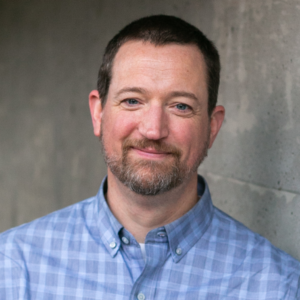 Kevin Schut (PhD, University of Iowa) is a Game Studies scholar. He is a graduate of Calvin College (Grand Rapids, MI; BA in Communication Arts & Sciences, History, 1996) and the University of Iowa (Iowa City, IA; MA and PhD in Communication Studies, 2004). He wrote the book Of Games and God: A Christian Exploration of Video Games (2013). He writes about the intersection of communication, culture, media, technology and faith, primarily by talking about computer and video games. He has published articles or chapters on fantasy-role-playing computer games and masculinity, on computer games and myth, on the presentation of history in computer games, and on evangelicals and games. He is currently researching moral and ethical decisions in video games. Kevin served as the Chair of the Department of Media + Communication, and he is the Lead for the Game Development program he founded in June 2019. He has also served as Associate Dean of the School of the Arts, Media + Culture. He teaches a range of courses on media and culture. Kevin grew up in Edmonton, Alberta, and still cheers for the Oilers. After graduating from Calvin College, he married and taught overseas in schools for missionary kids in the Cote d’Ivoire and Hungary for three and a half years. He has three daughters who love playing board games, adventure games, Mario Kart, and Vive Virtual Reality with him. His favorite game series is Sid Meier’s Civilization. Connect with Kevin here: https://www.twu.ca/profile/kevin-schut
Kevin Schut (PhD, University of Iowa) is a Game Studies scholar. He is a graduate of Calvin College (Grand Rapids, MI; BA in Communication Arts & Sciences, History, 1996) and the University of Iowa (Iowa City, IA; MA and PhD in Communication Studies, 2004). He wrote the book Of Games and God: A Christian Exploration of Video Games (2013). He writes about the intersection of communication, culture, media, technology and faith, primarily by talking about computer and video games. He has published articles or chapters on fantasy-role-playing computer games and masculinity, on computer games and myth, on the presentation of history in computer games, and on evangelicals and games. He is currently researching moral and ethical decisions in video games. Kevin served as the Chair of the Department of Media + Communication, and he is the Lead for the Game Development program he founded in June 2019. He has also served as Associate Dean of the School of the Arts, Media + Culture. He teaches a range of courses on media and culture. Kevin grew up in Edmonton, Alberta, and still cheers for the Oilers. After graduating from Calvin College, he married and taught overseas in schools for missionary kids in the Cote d’Ivoire and Hungary for three and a half years. He has three daughters who love playing board games, adventure games, Mario Kart, and Vive Virtual Reality with him. His favorite game series is Sid Meier’s Civilization. Connect with Kevin here: https://www.twu.ca/profile/kevin-schut
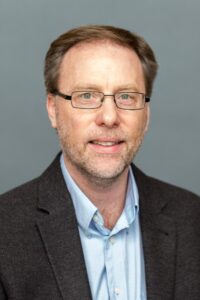 Derek Schuurman (PhD, McMaster University) worked as an electrical engineer for several years and later completed a doctorate in the area of robotics and computer vision using machine learning. He is currently professor of computer science at Calvin University, a fellow of the American Scientific Affiliation, and an advisor for AI&Faith. He has written about faith and technology issues in a variety of publications including monthly columns in Christian Courier and contributions to the Christian Scholars Review blog. He is the author of the book Shaping a Digital World: Faith, Culture and Computer Technology and co-author of A Christian Field Guide to Technology for Engineers and Designers, both published by InterVarsity Academic Press. Connect with Derek here: https://sites.calvin.edu/
Derek Schuurman (PhD, McMaster University) worked as an electrical engineer for several years and later completed a doctorate in the area of robotics and computer vision using machine learning. He is currently professor of computer science at Calvin University, a fellow of the American Scientific Affiliation, and an advisor for AI&Faith. He has written about faith and technology issues in a variety of publications including monthly columns in Christian Courier and contributions to the Christian Scholars Review blog. He is the author of the book Shaping a Digital World: Faith, Culture and Computer Technology and co-author of A Christian Field Guide to Technology for Engineers and Designers, both published by InterVarsity Academic Press. Connect with Derek here: https://sites.calvin.edu/
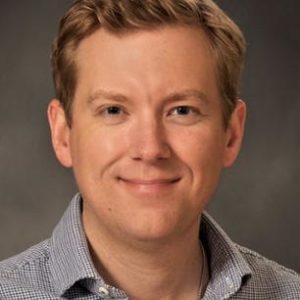 Chase Mitchell (PhD, Texas Tech University) is Assistant Professor of Media and Communication at East Tennessee State University, where he teaches courses in strategic communication, technical communication, and media studies. Chase also directs ETSU’s Technical and Professional Writing program. He contributes a monthly online column, “Image to Image,” for the Christianity and Communication Studies Network, and has published in scholarly and popular outlets such as Christian Scholar’s Review and FaithTech. Chase lives in Bristol, Tennessee, with his wife Mott and their two dogs, Bigfoot and Fuzzle. He enjoys baseball, books, and British comedy. When it’s nice outside, he and Mott love traipsin’ around the hills and rivers of southern Appalachia. Connect with Chase here: https://www.etsu.edu/cas/litlang/faculty/mitchell.php
Chase Mitchell (PhD, Texas Tech University) is Assistant Professor of Media and Communication at East Tennessee State University, where he teaches courses in strategic communication, technical communication, and media studies. Chase also directs ETSU’s Technical and Professional Writing program. He contributes a monthly online column, “Image to Image,” for the Christianity and Communication Studies Network, and has published in scholarly and popular outlets such as Christian Scholar’s Review and FaithTech. Chase lives in Bristol, Tennessee, with his wife Mott and their two dogs, Bigfoot and Fuzzle. He enjoys baseball, books, and British comedy. When it’s nice outside, he and Mott love traipsin’ around the hills and rivers of southern Appalachia. Connect with Chase here: https://www.etsu.edu/cas/litlang/faculty/mitchell.php
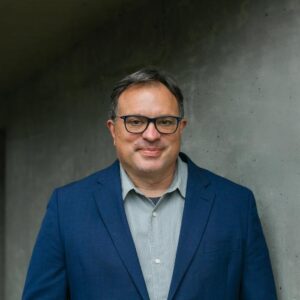 Scott Macklin (PhD, Nelson Mandela University) holds a MPhilF in Philosophical Aesthetics from the Institute for Christian Studies and a BA degree in Communication from Vanguard University (Summa Cum Laude). Scott creates stories using deep media and can usually be found looking for an espresso. He is an award-winning author, interactive designer and documentary filmmaker. His work focuses on developing narrative-based learning systems and comprehensive strategies to improve education and the ways we can reach and engage our students and constituents. His teaching and scholarship focus on developing critical career connected pathways. Central to his work is the notion of storytelling where stories are forged in the process of deep hanging out; where a story is made in collaboration with a community of practice, where one engages in the act of making the story “with” people from a particular community not just “about” them. Scott served as a Committee Member on the City of Seattle’s Music and Art Commission Community and Youth Development Commission, as the curator of TEDx Seattle, and on the advisory board of Seattle Interactive. He currently serves on the Board of Trustees for the Institute of Christian Studies. Connect with Scott here: www.scottmacklin.com
Scott Macklin (PhD, Nelson Mandela University) holds a MPhilF in Philosophical Aesthetics from the Institute for Christian Studies and a BA degree in Communication from Vanguard University (Summa Cum Laude). Scott creates stories using deep media and can usually be found looking for an espresso. He is an award-winning author, interactive designer and documentary filmmaker. His work focuses on developing narrative-based learning systems and comprehensive strategies to improve education and the ways we can reach and engage our students and constituents. His teaching and scholarship focus on developing critical career connected pathways. Central to his work is the notion of storytelling where stories are forged in the process of deep hanging out; where a story is made in collaboration with a community of practice, where one engages in the act of making the story “with” people from a particular community not just “about” them. Scott served as a Committee Member on the City of Seattle’s Music and Art Commission Community and Youth Development Commission, as the curator of TEDx Seattle, and on the advisory board of Seattle Interactive. He currently serves on the Board of Trustees for the Institute of Christian Studies. Connect with Scott here: www.scottmacklin.com
Robert H. Woods Jr. (PhD, Regent University) served as Professor of Communication and Media at Spring Arbor University for 20 years. He currently serves as the Executive Director of the Christianity and Communication Studies Network (CCSN) (www.theccsn.com), a non-profit network providing resources and training on faith-learning integration in the field of communication studies. He is the editor-in-chief of the CCSN’s imprint, Integratio Press. Dr. Woods has served as the President of the Religious Communication Association (RCA) and was named Scholar of the Year by RCA. He is the recipient of multiple research and scholarship awards and the editor/author of over a dozen books. Most recently, Dr. Woods is the co-author with Paul Patton on Everyday Sabbath: How to Lead Your Dance with Media and Technology in Mindful and Sacred Ways and Professing Christ: Christian Tradition and Faith-learning Integration in Public Universities. His book co-authored with Kevin Healey (University of New Hampshire), titled Ethics and Religion in the Age of Social Media: Digital Proverbs for Responsible Citizens received the Book of the Year Award from RCA. He currently serves as a visiting scholar at Trinity Western University. Connect with Robert here: www.roberthwoodsjr.com.
Registration Fee: $10.00 (Student) – $25.00 (General Admission)
No. 3
Strategies for Cultivating a Writing and Publishing Agenda while Teaching Full-time
Presenter/Facilitator: Robert Woods, Executive Director, Christianity and Communication Studies Network; Visiting Scholar, Trinity Western University
Date/Time: Wednesday, June 12, 2024 | 11:30 am – 3:00 pm EDT
Description: Faculty and administrators in Christian higher education who desire to write and publish are faced with unique challenges, including heavy teaching and student advising loads, limited resources, and a campus culture where classroom instruction is valued above research. How can individuals balance quality teaching and administration with a desire to do scholarship that integrates a Christian worldview and transforms lives? How do they “find time” to write when are faced with all the other things that go along with being a faculty member and administrator in Christian higher education?
Robert will share strategies from his own publishing experiences and conversations with more than 75 faculty from 50+ Christian colleges and universities about practical ways to cultivate a productive research and publishing agenda while carrying a full-time teaching load. Topics include motivations for writing, communication habits that help promote writing, and strategies for developing content for books. Outlining, writing schedules, and other strategies for bringing a project from concept to final publication will also be discussed. Participants will have an opportunity to connect with other authors and potential collaborators, and several Christian publishers.
Robert H. Woods Jr. (PhD, Regent University) served as Professor of Communication and Media at Spring Arbor University for 20 years. He currently serves as the Executive Director of the Christianity and Communication Studies Network (CCSN) (www.theccsn.com), a non-profit network providing resources and training on faith-learning integration in the field of communication studies. He is the editor-in-chief of the CCSN’s imprint, Integratio Press. Dr. Woods has served as the President of the Religious Communication Association (RCA) and was named Scholar of the Year by RCA. He is the recipient of multiple research and scholarship awards and the editor/author of over a dozen books. Most recently, Dr. Woods is the co-author with Paul Patton on Everyday Sabbath: How to Lead Your Dance with Media and Technology in Mindful and Sacred Ways and Professing Christ: Christian Tradition and Faith-learning Integration in Public Universities. His book co-authored with Kevin Healey (University of New Hampshire), titled Ethics and Religion in the Age of Social Media: Digital Proverbs for Responsible Citizens received the Book of the Year Award from RCA. He currently serves as a visiting scholar at Trinity Western University. Connect with Robert: www.roberthwoodsjr.com.
Registration Fee: $50.00
No. 4
Demystifying the Book Proposal Process: From Idea to Contract
Presenter/Facilitator: Al Hsu, Associate Editorial Director, InterVarsity Press
Date/Time: Tuesday, June 18, 2024 | 11:30 am – 3:00 pm EDT
Description: You have an idea for a book. How do you turn that idea into a book proposal that will lead to a contract and a published book? In this workshop, IVP associate editorial director Al Hsu provides a step-by-step guide through the book proposal process, from discerning the right project through the nuts and bolts of proposal components. He will describe how acquisitions editors and publishing boards review and evaluate book proposals and what you can do to improve your proposal’s chances of acceptance for publication. We will walk through case studies of actual proposals to look for best practices. Participants are encouraged to bring their own potential book ideas and proposals to a “shark tank” pitch session time. Whether presenting your own or listening to others, participants will benefit from Dr. Hsu’s questions and feedback designed to refine the proposal.
Al Hsu (pronounced “shee”) (PhD, Trinity Evangelical Divinity School) is associate editorial director at InterVarsity Press, where he acquires and develops books in such areas as church, culture, mission, apologetics, and social issues. In over twenty-five years at IVP, he has worked with over 300 authors and published more than 400 titles, including award-winning books by Michael Card, Mark Charles, Andy Crouch, Makoto Fujimura, Dominique Gilliard, Os Guinness, Tara Beth Leach, Soong-Chan Rah, Sarah Shin, Rachel Marie Stone, Nikki Toyama-Szeto, Richard Twiss, Sandra Van Opstal, and Terry Wildman. He has published books in partnership with such organizations as the Billy Graham Center, the Christian Community Development Association, International Justice Mission, Lutheran Hour Ministries, Missio Alliance, Operation World, the Urbana Student Missions Conference, The Veritas Forum, and World Relief.
Al has served as a columnist for Christianity Today magazine. He has taught writing workshops and seminars for InterVarsity Christian Fellowship, Evangelical Christian Publishers Association, Frederick Buechner Writer’s Workshop, Publishing in Color, Writing for Your Life, Christianity & Communication Studies Network, Oregon Christian Writers, Missio Alliance, Write to Publish, and Churches for the Sake of Others. He is the author of three books: Grieving a Suicide, The Suburban Christian, and Singles at the Crossroads. He lives in the western suburbs of Chicago with his wife and two sons. Connect with Al here: https://www.ivpress.com/albert-y-hsu
Registration Fee: $50.00
No. 5
Demystifying Author Platform: Key Elements for Publication and Promotion
Presenter/Facilitator: Al Hsu, Associate Editorial Director, InterVarsity Press
Date/Time: Friday, June 21, 2024 | 11:30 am – 3:00 pm EDT
Description: One of the most daunting parts of writing for publication is developing one’s platform. Every book proposal requires some statement of author platform. But contrary to popular belief, platform is not just celebrity or social media numbers. Platform is about your alignment with your book’s purpose and your capacity to bring it to an intended audience. In this workshop, IVP associate editorial director Al Hsu explores a theology of platform as an expression of vocation and calling, and he unpacks three key dimensions of platform. We will look at case studies of different kinds of platforms and ways that authors can cultivate platforms in ways that are consistent with who they are. Those attending this workshop will gain ideas for strengthening one’s platform for improved potential of proposal acceptance and successful book launch.
Al Hsu (pronounced “shee”) (PhD, Trinity Evangelical Divinity School) is associate editorial director at InterVarsity Press, where he acquires and develops books in such areas as church, culture, mission, apologetics, and social issues. In over twenty-five years at IVP, he has worked with over 300 authors and published more than 400 titles, including award-winning books by Michael Card, Mark Charles, Andy Crouch, Makoto Fujimura, Dominique Gilliard, Os Guinness, Tara Beth Leach, Soong-Chan Rah, Sarah Shin, Rachel Marie Stone, Nikki Toyama-Szeto, Richard Twiss, Sandra Van Opstal, and Terry Wildman. He has published books in partnership with such organizations as the Billy Graham Center, the Christian Community Development Association, International Justice Mission, Lutheran Hour Ministries, Missio Alliance, Operation World, the Urbana Student Missions Conference, The Veritas Forum, and World Relief.
Al has served as a columnist for Christianity Today magazine. He has taught writing workshops and seminars for InterVarsity Christian Fellowship, Evangelical Christian Publishers Association, Frederick Buechner Writer’s Workshop, Publishing in Color, Writing for Your Life, Christianity & Communication Studies Network, Oregon Christian Writers, Missio Alliance, Write to Publish, and Churches for the Sake of Others. He is the author of three books: Grieving a Suicide, The Suburban Christian, and Singles at the Crossroads. He lives in the western suburbs of Chicago with his wife and two sons. Connect with Al here: https://www.ivpress.com/albert-y-hsu
Registration Fee: $50.00
No. 6
Strategic Leadership for Christian Higher Education Administrators: Building New Programs
Lead Facilitator/Presenter: Kevin Schut, Trinity Western University
Roundtable Discussants: Tom Carmody, Vanguard University; Sarah Drivdahl, Northwest University; Donna Elkins, Campbellsville University; Nick Pertler, Point Loma Nazarene University
Date/Time: Monday, June 24, 2024 | 11:30 am – 3:00 pm EDT
Description: This half-day leadership workshop will feature conversations with veteran administrators at leading Christian colleges and universities. Short presentations followed by roundtable discussions and breakout sessions will be employed. The workshop concludes with an implementation session to produce individualized strategic development plans for the year ahead. This year our focus will be on a single topic: Building New Programs.
The motivations for starting a new academic program at a university can vary. Maybe a new faculty member has a unique specialization that we can leverage to build something new? Maybe more traditional programs are languishing and our institution is looking for fresh ideas? Maybe someone has identified a gap in post-secondary education and there are new opportunities to address? And, just maybe, sometimes we have a passion to build great things!?!
Whatever drives us, we will end up in a similar kind of situation: we have an idea and we need to make it a reality in our institution. Where do we begin? What are some useful practices? Is there anything we really should not overlook? Every post-secondary institution has its own procedures and regulations, of course, but administrators interested in program building can still learn important lessons from each other.
This workshop will provide a forum for people looking to build new programs. Led by Dr. Kevin Schut, creator of the Game Development program at Trinity Western University, a panel of experienced and talented administrators will share from their experiences of creating and modifying programs at their schools. We will spend time in conversation considering both the unique situations at various universities and also talk through commonly shared challenges and opportunities.
 Kevin Schut (PhD, University of Iowa) is a Game Studies scholar. He is a graduate of Calvin College (Grand Rapids, MI; BA in Communication Arts & Sciences, History, 1996) and the University of Iowa (Iowa City, IA; MA & PhD in Communication Studies, 2004). He wrote the book Of Games & God: A Christian Exploration of Video Games (2013). He writes about the intersection of communication, culture, media, technology and faith, primarily by talking about computer and video games. He has published articles or chapters on fantasy-role-playing computer games and masculinity, on computer games and myth, on the presentation of history in computer games, and on evangelicals and games. He is currently researching moral and ethical decisions in video games. Kevin served as the Chair of the Department of Media + Communication, and he is the Lead for the Game Development program he founded in June 2019. He has also served as Associate Dean of the School of the Arts, Media + Culture. He teaches a range of courses on media and culture. Kevin grew up in Edmonton, Alberta, and still cheers for the Oilers. After graduating from Calvin College, he married and taught overseas in schools for missionary kids in the Cote d’Ivoire and Hungary for three and a half years. He has three daughters who love playing board games, adventure games, Mario Kart, and Vive Virtual Reality with him. His favorite game series is Sid Meier’s Civilization. Connect with Kevin here: https://www.twu.ca/profile/kevin-schut
Kevin Schut (PhD, University of Iowa) is a Game Studies scholar. He is a graduate of Calvin College (Grand Rapids, MI; BA in Communication Arts & Sciences, History, 1996) and the University of Iowa (Iowa City, IA; MA & PhD in Communication Studies, 2004). He wrote the book Of Games & God: A Christian Exploration of Video Games (2013). He writes about the intersection of communication, culture, media, technology and faith, primarily by talking about computer and video games. He has published articles or chapters on fantasy-role-playing computer games and masculinity, on computer games and myth, on the presentation of history in computer games, and on evangelicals and games. He is currently researching moral and ethical decisions in video games. Kevin served as the Chair of the Department of Media + Communication, and he is the Lead for the Game Development program he founded in June 2019. He has also served as Associate Dean of the School of the Arts, Media + Culture. He teaches a range of courses on media and culture. Kevin grew up in Edmonton, Alberta, and still cheers for the Oilers. After graduating from Calvin College, he married and taught overseas in schools for missionary kids in the Cote d’Ivoire and Hungary for three and a half years. He has three daughters who love playing board games, adventure games, Mario Kart, and Vive Virtual Reality with him. His favorite game series is Sid Meier’s Civilization. Connect with Kevin here: https://www.twu.ca/profile/kevin-schut
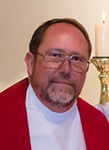 Thomas J. Carmody (PhD, Regent University) is Professor of Communication Studies at Vanguard University where he has taught for more than 30 years. His research interests span the spectrum from eighteenth to nineteenth-century sermonic rhetoric, Anglican Studies, comic books, graphic novels, film criticism. When he is not in the classroom you will find him searching the stacks of used bookstores or working in his small garden. He is also an ordained Anglican priest with the Anglican Church in North America where he ministers in a variety of ways at his local church. Connect with Tom here: https://www.vanguard.edu/school-of-business-management/communication/about/meet-the-faculty
Thomas J. Carmody (PhD, Regent University) is Professor of Communication Studies at Vanguard University where he has taught for more than 30 years. His research interests span the spectrum from eighteenth to nineteenth-century sermonic rhetoric, Anglican Studies, comic books, graphic novels, film criticism. When he is not in the classroom you will find him searching the stacks of used bookstores or working in his small garden. He is also an ordained Anglican priest with the Anglican Church in North America where he ministers in a variety of ways at his local church. Connect with Tom here: https://www.vanguard.edu/school-of-business-management/communication/about/meet-the-faculty
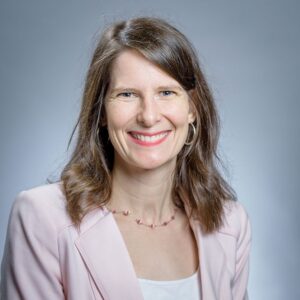 Sarah Drivdahl (PhD, Kent State University) serves as Provost and Professor of Psychology at Northwest University in Washington state. She previously served as Dean of the College of Arts and Sciences also at Northwest University. Her research interests focus in the area of memory, particularly in eyewitness and autobiographical memory. She has coauthored seven empirical papers and has contributed to presentations at meetings of the Psychonomics Society, Midwestern Psychological Society, and Western Psychological Association. Connect with Sarah here: https://www.northwestu.edu/faculty/sarah-drivdahl
Sarah Drivdahl (PhD, Kent State University) serves as Provost and Professor of Psychology at Northwest University in Washington state. She previously served as Dean of the College of Arts and Sciences also at Northwest University. Her research interests focus in the area of memory, particularly in eyewitness and autobiographical memory. She has coauthored seven empirical papers and has contributed to presentations at meetings of the Psychonomics Society, Midwestern Psychological Society, and Western Psychological Association. Connect with Sarah here: https://www.northwestu.edu/faculty/sarah-drivdahl
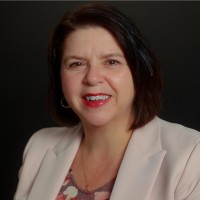 Donna Elkins (PhD, University of Kentucky) serves as Associate Vice President for Regional Administration at Campbellsville University, a Christ-focused university in the heartland of Kentucky. She is responsible for connection and oversight at all CU regional centers and also directs the CU Technology Training Center which houses workforce development certificate programs in Cosmetology, Barbering, Esthetics, Allied Health, Limited Medical Radiography, Welding, and HVAC. Prior to joining CU, Dr. Elkins was Dean of Online Education and a Professor of Communication at Spalding University as well as Dean of Academic Affairs, former Division Chair of Humanities, and Professor of Communication at Jefferson Community and Technical College. Dr. Elkins has published book chapters, journal articles, and presentations on leadership, virtual training, teaching and research methods in communication, onboarding new employees, cancer recovery and support in the workplace, and most recently women in entrepreneurial ventures post-pandemic. In 2023 she published her first Bible study titled Redeeming Failure which several women’s church study groups have used in their curriculum. Connect with Donna here: https://www.campbellsville.edu/campus-life/campus-resources/faculty/donna-m-elkins/
Donna Elkins (PhD, University of Kentucky) serves as Associate Vice President for Regional Administration at Campbellsville University, a Christ-focused university in the heartland of Kentucky. She is responsible for connection and oversight at all CU regional centers and also directs the CU Technology Training Center which houses workforce development certificate programs in Cosmetology, Barbering, Esthetics, Allied Health, Limited Medical Radiography, Welding, and HVAC. Prior to joining CU, Dr. Elkins was Dean of Online Education and a Professor of Communication at Spalding University as well as Dean of Academic Affairs, former Division Chair of Humanities, and Professor of Communication at Jefferson Community and Technical College. Dr. Elkins has published book chapters, journal articles, and presentations on leadership, virtual training, teaching and research methods in communication, onboarding new employees, cancer recovery and support in the workplace, and most recently women in entrepreneurial ventures post-pandemic. In 2023 she published her first Bible study titled Redeeming Failure which several women’s church study groups have used in their curriculum. Connect with Donna here: https://www.campbellsville.edu/campus-life/campus-resources/faculty/donna-m-elkins/
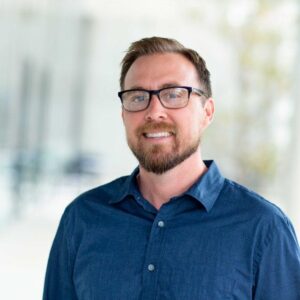 Nick Pertler (PhD, Duquesne University) is Associate Dean of Graduate & Professional Studies at Point Loma Nazarene University. After earning a B.A. in Communication from California State University, San Marcos (2007) and M.A. in Speech Communication from California State University, Fullerton (2009), Dr. Pertler moved to Pittsburgh, PA and completed a PhD in Rhetoric from Duquesne University (2014). With well over a decade of higher education teaching and leadership experience, he has served on the faculties of Duquesne University, Baker College and MiraCosta College. Additionally, he directs and teaches in the Strategic Communication B.A. program. His research agenda focuses on philosophy of education, the premodern rhetorical tradition, and media ecology. He has presented his work at regional and national conferences, and is currently working on moving a manuscript into publication with an academic press. Dr. Pertler and his wife Alison have five children. Connect with Nick here: https://www.pointloma.edu/faculty/nick-pertler-phd
Nick Pertler (PhD, Duquesne University) is Associate Dean of Graduate & Professional Studies at Point Loma Nazarene University. After earning a B.A. in Communication from California State University, San Marcos (2007) and M.A. in Speech Communication from California State University, Fullerton (2009), Dr. Pertler moved to Pittsburgh, PA and completed a PhD in Rhetoric from Duquesne University (2014). With well over a decade of higher education teaching and leadership experience, he has served on the faculties of Duquesne University, Baker College and MiraCosta College. Additionally, he directs and teaches in the Strategic Communication B.A. program. His research agenda focuses on philosophy of education, the premodern rhetorical tradition, and media ecology. He has presented his work at regional and national conferences, and is currently working on moving a manuscript into publication with an academic press. Dr. Pertler and his wife Alison have five children. Connect with Nick here: https://www.pointloma.edu/faculty/nick-pertler-phd
Registration Fee: $50.00
No. 7
Pastor, Pew, and Public: Communicating Truth in a Post-Truth, Politically Divided Nation
Lead Facilitator/Presenter: Brandon Knight, William Carey University
Keynote Presenters: Daniel Darling, Southwestern Baptist Theological Seminary; Rick Langer, Biola University; Tim Muehlhoff, Biola University
Date/Time: Wednesday, June 26, 2024 | 11:30 am – 3:00 pm EDT
Description: “What is truth?” Even two millennia after the trial of Jesus, Pontius Pilate’s question similarly stands as an affront to the Christian church and its message. Christians are no strangers to critiques and the deconstruction of truth. The focus moving forward, therefore, should be on the effectiveness of our communicative response. Numerous Christian leaders, pastors, and lay professionals desire wisdom and discernment to move beyond the division and confusion of the current public arena that are all too like the trial of Jesus, where “truth” was not the goal. The upcoming 2024 presidential election provides an opportunity to reflect on how we can communicate truth to followers of Christ who love Jesus and the Church yet hold widely different political viewpoints. How do we accomplish this goal without dividing the Church? How can we communicate biblical truths that transcend political divisions? This workshop suggests that faithful Christian communicators discover effective tools for communicating the gospel in an ideologically divided culture by turning to the field of communication studies.
Throughout this workshop, several communication and rhetorical scholars will share ways to advance biblical truth in a post-truth age to both congregants and external publics. All participants will have the opportunity to ask questions and engage in small-group discussion throughout our time together.
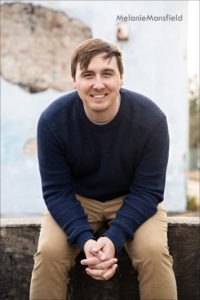 Brandon Knight (PhD, University of Southern Mississippi) is Assistant Professor of Speech Communication and Director of Forensics at William Carey University. Brandon also earned an MDiv with an emphasis in Biblical Studies from New Orleans Baptist Theological Seminary. Prior to teaching in the Academy, Brandon served as a youth pastor for five years at two locations in the local Hub City area and, more recently, served as an interim at Leaf River Baptist Church in Collins, Mississippi. Brandon’s research is featured in the Journal of Communication and Religion, Management Communication Quarterly, the Journal of Christian Teaching Practice (in Communication Studies), the Interdisciplinary Journal of Research on Religion, and, most recently, the Journal of the Evangelical Homiletics Society. Connect with Brandon here: https://www.wmcarey.edu/contact/brandon-knight
Brandon Knight (PhD, University of Southern Mississippi) is Assistant Professor of Speech Communication and Director of Forensics at William Carey University. Brandon also earned an MDiv with an emphasis in Biblical Studies from New Orleans Baptist Theological Seminary. Prior to teaching in the Academy, Brandon served as a youth pastor for five years at two locations in the local Hub City area and, more recently, served as an interim at Leaf River Baptist Church in Collins, Mississippi. Brandon’s research is featured in the Journal of Communication and Religion, Management Communication Quarterly, the Journal of Christian Teaching Practice (in Communication Studies), the Interdisciplinary Journal of Research on Religion, and, most recently, the Journal of the Evangelical Homiletics Society. Connect with Brandon here: https://www.wmcarey.edu/contact/brandon-knight
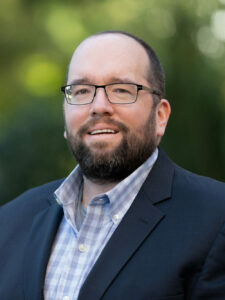 Daniel Darling is a bestselling author of several books, including The Original Jesus, The Dignity Revolution, The Characters of Christmas, The Characters of Easter, A Way With Words. and his latest, Agents of Grace: How to Bridge Divides and Love as Jesus Loves. He is the general editor, along with Trillia Newbell, of a small group study on racial reconciliation, The Church and the Racial Divide and is a contributor to The Worldview Study Bible. Dan is an award–winning writer whose work has appeared in numerous publications. He is a columnist for World magazine and a regular contributor to USA Today. Dan’s work has been featured in Christianity Today, The Gospel Coalition, and The Dispatch and his op-eds have appeared in The Washington Post, CNN, Washington Times, Time, Huffington Post, National Review, First Things, The Spectator, and other leading outlets. Publisher’s Weekly called his writing style “substantive and punchy.” Dan speaks and preaches around the country and is regularly interviewed on radio and television, including MSNBC’s Morning Joe, CNN, and Fox News. He has been profiled by The New York Times. Dan is the host of a popular weekly podcast, The Way Home, where he interviews Christian leaders, politicians, and journalists. Dan holds a bachelor’s degree in pastoral ministry from Dayspring Bible College, has studied at Trinity Evangelical Divinity School, and is a graduate of Southern Baptist Theological Seminary. Darling has also spoken at churches and conferences around the country and has lectured at Union University, Oklahoma Baptist University, Southwest Assemblies of God University, Taylor University, Judson College, and Dallas Baptist University. Dan has served churches in Illinois and Tennessee. He and his wife Angela have four children. Connect with Daniel here: https://danieldarling.com/
Daniel Darling is a bestselling author of several books, including The Original Jesus, The Dignity Revolution, The Characters of Christmas, The Characters of Easter, A Way With Words. and his latest, Agents of Grace: How to Bridge Divides and Love as Jesus Loves. He is the general editor, along with Trillia Newbell, of a small group study on racial reconciliation, The Church and the Racial Divide and is a contributor to The Worldview Study Bible. Dan is an award–winning writer whose work has appeared in numerous publications. He is a columnist for World magazine and a regular contributor to USA Today. Dan’s work has been featured in Christianity Today, The Gospel Coalition, and The Dispatch and his op-eds have appeared in The Washington Post, CNN, Washington Times, Time, Huffington Post, National Review, First Things, The Spectator, and other leading outlets. Publisher’s Weekly called his writing style “substantive and punchy.” Dan speaks and preaches around the country and is regularly interviewed on radio and television, including MSNBC’s Morning Joe, CNN, and Fox News. He has been profiled by The New York Times. Dan is the host of a popular weekly podcast, The Way Home, where he interviews Christian leaders, politicians, and journalists. Dan holds a bachelor’s degree in pastoral ministry from Dayspring Bible College, has studied at Trinity Evangelical Divinity School, and is a graduate of Southern Baptist Theological Seminary. Darling has also spoken at churches and conferences around the country and has lectured at Union University, Oklahoma Baptist University, Southwest Assemblies of God University, Taylor University, Judson College, and Dallas Baptist University. Dan has served churches in Illinois and Tennessee. He and his wife Angela have four children. Connect with Daniel here: https://danieldarling.com/
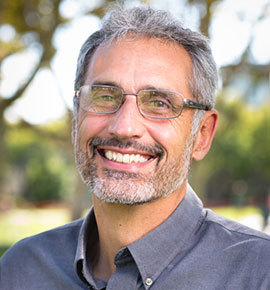 Rick Langer (PhD, University of California, Riverside) is a professor at Biola University, the Director of the Office of Faith and Learning, and co-director of the Winsome Conviction Project which seeks to help depolarize our discourse in the church, in Christian universities, and in the public square. He has authored three books and numerous journal articles applying theology to a wide variety of disciplines including business leadership, disability, suffering, bioethics, and vocation. He served as a pastor of a large evangelical church for 20 years before joining the faculty of Biola University in 2005. He has served on many boards and other leadership roles that have given him wide-ranging experience in conflict resolution within Christian churches, boards, universities and organizations. Connect with Rick here: https://www.biola.edu/directory/people/richard-langer
Rick Langer (PhD, University of California, Riverside) is a professor at Biola University, the Director of the Office of Faith and Learning, and co-director of the Winsome Conviction Project which seeks to help depolarize our discourse in the church, in Christian universities, and in the public square. He has authored three books and numerous journal articles applying theology to a wide variety of disciplines including business leadership, disability, suffering, bioethics, and vocation. He served as a pastor of a large evangelical church for 20 years before joining the faculty of Biola University in 2005. He has served on many boards and other leadership roles that have given him wide-ranging experience in conflict resolution within Christian churches, boards, universities and organizations. Connect with Rick here: https://www.biola.edu/directory/people/richard-langer
Tim Muehlhoff (PhD, University of North Carolina at Chapel Hill) is a Professor of Communication at Biola University in La Mirada, California where he teaches classes in conflict resolution, apologetics, gender, and family communication. He is co-director of Biola’s Winsome Conviction Project that seeks to reintroduce compassion and civility into our disagreements. He’s the co-host of the Winsome Conviction Podcast where people with differing viewpoints are brought on for engaging dialogue. For more, check out Winsome Conviction Project. Tim has written extensively in the area of cultural engagement and conflict resolution including Winsome Conviction: Disagreeing without Dividing the Church and Winsome Persuasion: Christian Influence in a Post Christian World (with Biola professor Rick Langer) each having received a merit award from Christianity Today’s Book of the Year Awards. Tim’s newest book (co-written with Sean McDowell) is End the Stalemate: Moving Past Cancel Culture to Meaningful Conversations (Tyndale). Connect with Tim here: https://www.biola.edu/directory/people/timothy-muehlhoff
Registration Fee: $50.00
No. 8
Teaching Toward Diversity and Justice in Christian Higher Education
Lead Presenter/Facilitator: John Hatch, Eastern University, retired; CCSN Senior Fellow
Roundtable Discussants: Jasmine “Jaz” Gray, Pepperdine University; Diana Martinez, Pepperdine University; Jennifer Akamine Phillips, Pepperdine University; Sara Shaban, Seattle Pacific University
Date/Time: Wednesday, July 10, 2024 | 11:30-3:00 pm EDT
Description: How can Christian faculty to justice do the full scope of human/cultural diversity in our teaching? And how can we disarm the defensiveness felt by some students when class material confronts matters of diversity and social justice? Are there ways to turn resistance into willingness to take a closer look? How do we make sure we are promoting critical thinking rather than indoctrination?
In answering these questions, this year’s workshop will expand its representation of diversity with four new presenters, each addressing a particular area of cultural/physical difference. After an introductory presentation on teaching toward diversity and justice in Christian higher education, we will learn about the distinctive cultural assets and social challenges inherited and experienced by Asian-Americans, Latinas/os, Arabs (including Arab Christians), and people with physical disabilities/differences. The presentations will consider how to improve the cultural competence of our students related to these groups’ identities and situations, as well as support students from these backgrounds.
Besides workshop facilitator John B. Hatch (CCSN Senior Fellow), our presenters will include Jasmine “Jaz” Gray, Pepperdine University; Diana Martinez, Pepperdine University; Jennifer Akamine Phillips, Pepperdine University; and Sara Shaban, Seattle Pacific University
Following their individual presentations, the contributors will participate in a roundtable discussion about their experiences and insights as diverse faculty at Christian universities. During the workshop, attendees will have several opportunities to ask questions and enrich the discussion.
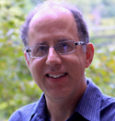 John Hatch (PhD, Regent University), CCSN Senior Fellow, Professor and Chair of Communication Studies, Eastern University (retired). Dr. Hatch became interested in the intersection of faith, communication, and culture through his involvement in Youth With A Mission in Mexico, Belize, Honduras, and Navajoland during the 1980s. During his doctoral studies at Regent University, his intercultural interests broadened, and he began to focus on race relations and public reconciliation initiatives. Dr. Hatch’s research interests include racial reconciliation, public apologies, dialogic rhetoric, religious discourse, the rhetoric of popular music, and contemporary Christian music. He has made numerous presentations at academic conferences and published extensively on these topics. He is the author of an award-winning scholarly monograph on the rhetoric of racial reconciliation and an undergraduate-friendly anthology of speeches on reconciliation by diverse political and religious leaders. Connect with John here: https://www.theccsn.com/john-hatch-ccsn-senior-fellow/
John Hatch (PhD, Regent University), CCSN Senior Fellow, Professor and Chair of Communication Studies, Eastern University (retired). Dr. Hatch became interested in the intersection of faith, communication, and culture through his involvement in Youth With A Mission in Mexico, Belize, Honduras, and Navajoland during the 1980s. During his doctoral studies at Regent University, his intercultural interests broadened, and he began to focus on race relations and public reconciliation initiatives. Dr. Hatch’s research interests include racial reconciliation, public apologies, dialogic rhetoric, religious discourse, the rhetoric of popular music, and contemporary Christian music. He has made numerous presentations at academic conferences and published extensively on these topics. He is the author of an award-winning scholarly monograph on the rhetoric of racial reconciliation and an undergraduate-friendly anthology of speeches on reconciliation by diverse political and religious leaders. Connect with John here: https://www.theccsn.com/john-hatch-ccsn-senior-fellow/
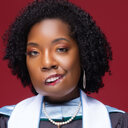 Jasmine “Jaz” Gray (PhD, University of North Carolina at Chapel Hill) believes that story transforms the soul. She is a narrative researcher with expertise in entertainment and patient narratives who is interested in both how people in marginalized communities can use narrative to develop resiliency and how the media production process can be used to empower those communities. After earning a bachelor’s with a concentration in Journalism from Middle Tennessee State University and a master’s in Television, Radio, and Film from Syracuse University, she spent five years in Hollywood working for companies including BET and Paramount Pictures. During that time, she founded the company’s first ad hoc committee to address health-related diversity among employees. Most recently, as a doctoral fellow at UNC Chapel Hill, she developed an innovative storytelling tool called life plotting which repurposes the narrative structure and character arc underlying fictional stories for use by real people, empowering them with self-affirmation and story sharing skills to learn about themselves and share their stories with others. For her academic work so far, she was awarded the 2020 Barrow Doctoral Scholarship from the Association for Education in Journalism and Mass Communication (AEJMC). Her passion for story also motivates the way she teaches and relates to students. She looks forward to continuing to support a new, diverse generation of professionals in the communication field. She is also excited to continue centering her work in service. Her nonprofit Jaz’s Jammies has collected nearly 7,000 pairs of pajamas for sick and displaced children and organized volunteer opportunities for over 2,000 people. Connect with Jaz here: https://seaver.pepperdine.edu/academics/faculty/jasmine-gray/
Jasmine “Jaz” Gray (PhD, University of North Carolina at Chapel Hill) believes that story transforms the soul. She is a narrative researcher with expertise in entertainment and patient narratives who is interested in both how people in marginalized communities can use narrative to develop resiliency and how the media production process can be used to empower those communities. After earning a bachelor’s with a concentration in Journalism from Middle Tennessee State University and a master’s in Television, Radio, and Film from Syracuse University, she spent five years in Hollywood working for companies including BET and Paramount Pictures. During that time, she founded the company’s first ad hoc committee to address health-related diversity among employees. Most recently, as a doctoral fellow at UNC Chapel Hill, she developed an innovative storytelling tool called life plotting which repurposes the narrative structure and character arc underlying fictional stories for use by real people, empowering them with self-affirmation and story sharing skills to learn about themselves and share their stories with others. For her academic work so far, she was awarded the 2020 Barrow Doctoral Scholarship from the Association for Education in Journalism and Mass Communication (AEJMC). Her passion for story also motivates the way she teaches and relates to students. She looks forward to continuing to support a new, diverse generation of professionals in the communication field. She is also excited to continue centering her work in service. Her nonprofit Jaz’s Jammies has collected nearly 7,000 pairs of pajamas for sick and displaced children and organized volunteer opportunities for over 2,000 people. Connect with Jaz here: https://seaver.pepperdine.edu/academics/faculty/jasmine-gray/
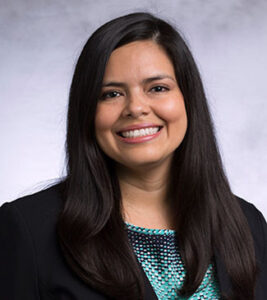 Diana Martinez (PhD, The University of Texas at Austin) is an Associate Professor of Communication in the Communication Division at Seaver College. Her research explores physical and psychological borderlands, a term coined by Gloria Anzaldúa to describe spaces of social, political, and cultural struggle. She is working on archival research with the Gloria Anzaldúa collection, and she is also interested in issues surrounding social movements, intercultural dialogue, public memory, and visual rhetoric. Her recent published research has appeared in journals such as Western Journal of Communication, Communication Quarterly and The Journal of Multimodal Rhetorics as well as edited books. She co-edited the monograph Latina/o Communication Studies: Theories, Methods, and Practice. She teaches courses in rhetoric and leadership, communication studies, and culture and serves as the faculty advisor for the Pepperdine Journal of Communication Research. Connect with Diane here: https://seaver.pepperdine.edu/academics/faculty/diana-martinez/
Diana Martinez (PhD, The University of Texas at Austin) is an Associate Professor of Communication in the Communication Division at Seaver College. Her research explores physical and psychological borderlands, a term coined by Gloria Anzaldúa to describe spaces of social, political, and cultural struggle. She is working on archival research with the Gloria Anzaldúa collection, and she is also interested in issues surrounding social movements, intercultural dialogue, public memory, and visual rhetoric. Her recent published research has appeared in journals such as Western Journal of Communication, Communication Quarterly and The Journal of Multimodal Rhetorics as well as edited books. She co-edited the monograph Latina/o Communication Studies: Theories, Methods, and Practice. She teaches courses in rhetoric and leadership, communication studies, and culture and serves as the faculty advisor for the Pepperdine Journal of Communication Research. Connect with Diane here: https://seaver.pepperdine.edu/academics/faculty/diana-martinez/
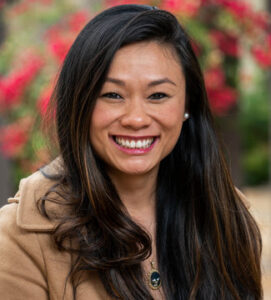 Jennifer Akamine Phillips (PhD in Progress, Azusa Pacific University) is a Fixed-Term Assistant Professor of Communication at Pepperdine University. Phillips’ areas of teaching primarily include Intercultural Communication as well as Public Speaking and Rhetorical Analysis. She grew up in Southern California and earned her Bachelor’s degree in Communication Studies from Pepperdine University. Phillips also earned a double Master’s degree in College Counseling and Student Development (MS) and a Master’s degree in Violin Performance (MM) from Azusa Pacific University. She is currently pursuing her PhD in Higher Education, focusing her research on Japanese American faculty who are advocates of racial justice in the college classroom. Her areas of study include Japanese American Identity and racial justice advocacy in higher education settings. Connect with Jennifer here: https://seaver.pepperdine.edu/academics/faculty/jennifer-phillips/
Jennifer Akamine Phillips (PhD in Progress, Azusa Pacific University) is a Fixed-Term Assistant Professor of Communication at Pepperdine University. Phillips’ areas of teaching primarily include Intercultural Communication as well as Public Speaking and Rhetorical Analysis. She grew up in Southern California and earned her Bachelor’s degree in Communication Studies from Pepperdine University. Phillips also earned a double Master’s degree in College Counseling and Student Development (MS) and a Master’s degree in Violin Performance (MM) from Azusa Pacific University. She is currently pursuing her PhD in Higher Education, focusing her research on Japanese American faculty who are advocates of racial justice in the college classroom. Her areas of study include Japanese American Identity and racial justice advocacy in higher education settings. Connect with Jennifer here: https://seaver.pepperdine.edu/academics/faculty/jennifer-phillips/
Sara Shaban (PhD, University of Missouri),identifies as a critical/cultural scholar focused on the intersections between media, women’s social movements, and geopolitics in the Middle East. Shaban’s academic work is rooted within the theoretical frameworks of transnationalism and femonationalism. Her award-winning research is published in the International Journal of Communication, Communication and Critical Cultural Studies, and Journalism: Theory, Practice & Criticism. Prior to life in academia, Shaban worked in U.S. local news as a producer before pursuing freelance journalism in Israel, the West Bank, and Sierra Leone. Shaban is fueled by her passion for social justice, specifically for immigrants and refugees. She was involved in initiatives to improve conditions for incoming refugees during the 2015 crisis and served as a volunteer and board member for the Immigrant and Refugee Women’s Program in St. Louis. Additionally, she served as the communications director for the St. Louis based NGO Project Peanut Butter — an organization committed to the eradication of child malnutrition throughout sub-Saharan Africa. Connect with Sara here: https://spu.edu/academics/college-of-arts-sciences/communication-and-journalism/faculty-staff-directory/shaban-sara
Registration Fee: $50.00
No. 9
The Four Voices of Faithful Christian Communication in a Connected World
Lead Presenter/Facilitator: Robert Stephen Reid, Emeritus Professor of Communication at the University of Dubuque
Date/Time: Monday, July 15, 2024 | 11:30 am – 3:00 pm EDT
Description: Whether you are a pastor standing on the church platform, a professor engaging questions of faith, an author or a digital faith content creator seeking to encourage faith, you need to be able to frame what you have to say to fit the audience to whom you are (p)reaching. Most of us have a default, one-size fits all “screen” that shapes the implicit or explicit response we hope to elicit. Yet audiences searching for meaningful faith talk and text are increasingly diverse in the worldview questions they bring to these engagements. So, Christian communicators who want to be effective in reaching people with differing worldviews will want to know what their own default worldview voice is since that voice is the second nature set of assumptions of their faith appeals. They will also want to know how they can bring greater congruence and authenticity in the expression of this voice as their witness to faith in God. So, in this workshop you will gain fresh insight into the dominant, second-nature voice you depend on that speaks your faith, and discover ways to shift your (p)reaching voice as needed to help take listeners on a shared journey of coming-to-understanding in matters of faith.
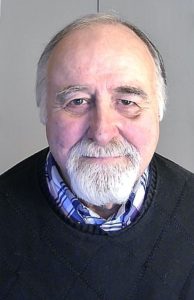 Robert Stephen Reid (PhD, University of Washington) is Emeritus Professor of Communication at the University of Dubuque, where he served as Dept Head for 14 years and Director of the graduate Master of Arts in Communication (MAC) program for 17 years. He served as homiletics faculty for the Seattle School of Theology and Ministry and Fuller Theological Seminary, Northwest. He also served as the Convener of the Rhetoric Working Group of the Academy of Homiletics from 2000-2015. Bob’s revised edition of The Four Voices of Preaching (Integratio Press, 20024) is now available. It is one five books about preaching/homiletics he has published. Notable in his published essays is the overarching introductory essay on the Rhetoric division of The New Interpreter’s Handbook of Preaching (Abingdon Press: 2008) that examines preaching from the perspective of “Seeking a Response.” Connect with Bob here: https://robertreid.academia.edu/
Robert Stephen Reid (PhD, University of Washington) is Emeritus Professor of Communication at the University of Dubuque, where he served as Dept Head for 14 years and Director of the graduate Master of Arts in Communication (MAC) program for 17 years. He served as homiletics faculty for the Seattle School of Theology and Ministry and Fuller Theological Seminary, Northwest. He also served as the Convener of the Rhetoric Working Group of the Academy of Homiletics from 2000-2015. Bob’s revised edition of The Four Voices of Preaching (Integratio Press, 20024) is now available. It is one five books about preaching/homiletics he has published. Notable in his published essays is the overarching introductory essay on the Rhetoric division of The New Interpreter’s Handbook of Preaching (Abingdon Press: 2008) that examines preaching from the perspective of “Seeking a Response.” Connect with Bob here: https://robertreid.academia.edu/
Registration Fee: $50.00
No. 10
Faithful Voices: Navigating Speech and Debate in a Postmodern Landscape
Lead Presenter/Facilitator: Ben Voth, Southern Methodist University
Additional Presenter/Roundtable Discussants: Mike Ingram, Whitworth University; Brandon Knight, William Carey University; Sheila Ritchie, Abilene Christian University; Rebekah Heflin Whitaker, Union University
Date/Time: Thursday, July 18, 2024 | 11:30 am – 3:00 pm EDT
Description: Only a few understand the complexities of coaching collegiate speech and debate in the twenty-first century. However, even fewer understand the complexities of coaching collegiate speech and debate as a Christian. Whereas many of the issues are the same, like students and administration questioning the usefulness of speech and debate, Christian coaches uniquely have to navigate the postmodern landscape. This virtual workshop aims to explore how Christian coaches can better guide students and programs in expressing their Christian perspective authentically even while they negotiate the political and ideological tensions of the forensic world. Throughout this workshop, several other distinguished forensics directors will share specific insights on how to remain a faithful voice despite the effects of postmodernity.
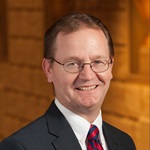 Ben Voth (PhD, University of Kansas) is an academic expert in debate, argumentation, communication, public speaking and rhetoric. He is specialist on questions of genocide, political debate, humor and politics, and general public controversies. He researches and teaches with a goal of equipping individuals to have a voice in the world. He has published four books on how individual communication abilities can positively change the world: James Farmer Jr.: The Great Debater; Social Fragmentation and the Decline of American Democracy: The End of the Social Contract; and The Rhetoric of Genocide: Death as a Text. His most current book Debate as Global Pedagogy: Rwanda Rising details a variety of efforts globally to combat genocide with debate instruction while focusing on the unique events of the 1994 Rwandan genocide and a 25 year anniversary debate institute he helped lead for 400 high school students and more than 50 high school teachers in Rwanda in 2019. Voth’s unique approach to communication emphasizes the role of free speech, dissent, and argument in preventing and reversing problems of human injustice. Specializing in a rhetorical studies approach allows him to teach courses in public speaking, argumentation and debate, persuasion theory, political communication, communication and ethnoviolence, communication and genocide. As director of speech and debate, Voth has coached more than a twenty five national and international champions of collegiate speech and debate events including International Public Debate Association’s varsity competitions, novice policy debate, persuasive speaking, communication analysis, and impromptu speaking. Connect with Ben here: https://www.smu.edu/dedman/about/administrative-directory/voth
Ben Voth (PhD, University of Kansas) is an academic expert in debate, argumentation, communication, public speaking and rhetoric. He is specialist on questions of genocide, political debate, humor and politics, and general public controversies. He researches and teaches with a goal of equipping individuals to have a voice in the world. He has published four books on how individual communication abilities can positively change the world: James Farmer Jr.: The Great Debater; Social Fragmentation and the Decline of American Democracy: The End of the Social Contract; and The Rhetoric of Genocide: Death as a Text. His most current book Debate as Global Pedagogy: Rwanda Rising details a variety of efforts globally to combat genocide with debate instruction while focusing on the unique events of the 1994 Rwandan genocide and a 25 year anniversary debate institute he helped lead for 400 high school students and more than 50 high school teachers in Rwanda in 2019. Voth’s unique approach to communication emphasizes the role of free speech, dissent, and argument in preventing and reversing problems of human injustice. Specializing in a rhetorical studies approach allows him to teach courses in public speaking, argumentation and debate, persuasion theory, political communication, communication and ethnoviolence, communication and genocide. As director of speech and debate, Voth has coached more than a twenty five national and international champions of collegiate speech and debate events including International Public Debate Association’s varsity competitions, novice policy debate, persuasive speaking, communication analysis, and impromptu speaking. Connect with Ben here: https://www.smu.edu/dedman/about/administrative-directory/voth
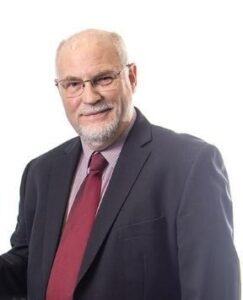 Mike Ingram (PhD, Ohio University) is Professor of Communication Studies at Whitworth University. Ingram coached forensics at Carson-Newman University and Ohio University before coming to Whitworth in 1988. His teams have placed in the top five at national tournaments for the International Public Debate Association (IPDA) and the National Christian College Forensics Association (NCCFA), and they have placed in the top 20 at the National Forensics Association and the National Parliamentary Debate Association. Ingram has served in leadership roles in the Northwest Forensics Conference, the IPDA and the NCCFA; at Whitworth, he has chaired the communication studies department and has served a seven-year appointment as associate provost for faculty development and scholarship. He has been recognized as the coach of the year by the NFC, the NCCFA and the IPDA. Currently he is president of the Northwest Forensics Conference and the National Christian College Forensics Association. Connect with Mike here: https://forms.whitworth.edu/directory/index/person/mingram
Mike Ingram (PhD, Ohio University) is Professor of Communication Studies at Whitworth University. Ingram coached forensics at Carson-Newman University and Ohio University before coming to Whitworth in 1988. His teams have placed in the top five at national tournaments for the International Public Debate Association (IPDA) and the National Christian College Forensics Association (NCCFA), and they have placed in the top 20 at the National Forensics Association and the National Parliamentary Debate Association. Ingram has served in leadership roles in the Northwest Forensics Conference, the IPDA and the NCCFA; at Whitworth, he has chaired the communication studies department and has served a seven-year appointment as associate provost for faculty development and scholarship. He has been recognized as the coach of the year by the NFC, the NCCFA and the IPDA. Currently he is president of the Northwest Forensics Conference and the National Christian College Forensics Association. Connect with Mike here: https://forms.whitworth.edu/directory/index/person/mingram
 Brandon Knight (PhD, University of Southern Mississippi) is Assistant Professor of Speech Communication and Director of Forensics at William Carey University. Brandon also earned an MDiv with an emphasis in Biblical Studies from New Orleans Baptist Theological Seminary. Prior to teaching in the Academy, Brandon served as a youth pastor for five years at two locations in the local Hub City area and, more recently, served as an interim at Leaf River Baptist Church in Collins, Mississippi. Brandon’s research is featured in the Journal of Communication and Religion, Management Communication Quarterly, the Journal of Christian Teaching Practice (in Communication Studies), the Interdisciplinary Journal of Research on Religion, and, most recently, the Journal of the Evangelical Homiletics Society. Connect with Brandon here: https://www.wmcarey.edu/contact/brandon-knight
Brandon Knight (PhD, University of Southern Mississippi) is Assistant Professor of Speech Communication and Director of Forensics at William Carey University. Brandon also earned an MDiv with an emphasis in Biblical Studies from New Orleans Baptist Theological Seminary. Prior to teaching in the Academy, Brandon served as a youth pastor for five years at two locations in the local Hub City area and, more recently, served as an interim at Leaf River Baptist Church in Collins, Mississippi. Brandon’s research is featured in the Journal of Communication and Religion, Management Communication Quarterly, the Journal of Christian Teaching Practice (in Communication Studies), the Interdisciplinary Journal of Research on Religion, and, most recently, the Journal of the Evangelical Homiletics Society. Connect with Brandon here: https://www.wmcarey.edu/contact/brandon-knight
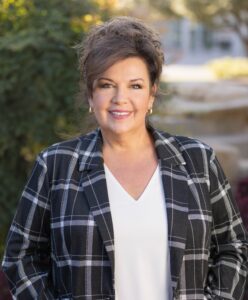 Sheila Ritchie (MA, Abilene Christian University) has taught college and university students since 1993, and finds some of her greatest joy in watching her students succeed. She has been privileged to work with some outstanding students and gets to cheer them on daily. Ritchie’s primary field is teaching Communication at Abilene Christian University where she is an Associate College Professor. She teaches a wide range of courses designed to improve communication, reasoning, and delivery. Sheila is also the Director of Forensics and Debate and has coached ACU’s nationally-ranked IPDA debate team for the last six years. In 2021, she was honored to be chosen as the International Public Debate Association Coach of the Year. When not with students, Sheila spends as much time as possible with her four grown children and her husband of 30+ years. Her family often joins her in debate related activities, and two of her children teach on the collegiate level. Whether teaching, coaching debate, or helping students with public speaking contests, Sheila has a passion for seeing students live out their potential and helping them along the way. Connect with Sheila here: https://acu.edu/faculty/sheila-ritchie/
Sheila Ritchie (MA, Abilene Christian University) has taught college and university students since 1993, and finds some of her greatest joy in watching her students succeed. She has been privileged to work with some outstanding students and gets to cheer them on daily. Ritchie’s primary field is teaching Communication at Abilene Christian University where she is an Associate College Professor. She teaches a wide range of courses designed to improve communication, reasoning, and delivery. Sheila is also the Director of Forensics and Debate and has coached ACU’s nationally-ranked IPDA debate team for the last six years. In 2021, she was honored to be chosen as the International Public Debate Association Coach of the Year. When not with students, Sheila spends as much time as possible with her four grown children and her husband of 30+ years. Her family often joins her in debate related activities, and two of her children teach on the collegiate level. Whether teaching, coaching debate, or helping students with public speaking contests, Sheila has a passion for seeing students live out their potential and helping them along the way. Connect with Sheila here: https://acu.edu/faculty/sheila-ritchie/
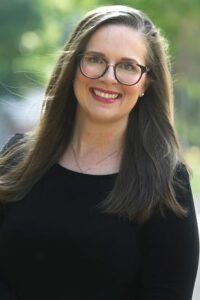 Rebekah Heflin Whitaker (PhD, Louisiana State University) has been at Union University since 2019. She currently serves as a Visiting Assistant Professor of Communication Arts and Director of Debate. Whitaker is a member of the National Communication Association and is the Secretary of the Applied Communication Division. She is also a member of the International Communication Association. Whitaker’s research focuses on the intersections of interpersonal and organizational communication and communication pedagogy. Whitaker is married to James, a waterfowl biologist for Tennessee Wildlife Resource Agency. Together the Whitakers are members of Calvary Baptist Church and enjoy travel, cooking, and planning activities but taking naps instead. They are managed by the Queen of the Household, their senior Dachshund, Daisy. Connect with Rebekah here: https://www.uu.edu/dept/commarts/faculty/rebekah-whitaker.cfm
Rebekah Heflin Whitaker (PhD, Louisiana State University) has been at Union University since 2019. She currently serves as a Visiting Assistant Professor of Communication Arts and Director of Debate. Whitaker is a member of the National Communication Association and is the Secretary of the Applied Communication Division. She is also a member of the International Communication Association. Whitaker’s research focuses on the intersections of interpersonal and organizational communication and communication pedagogy. Whitaker is married to James, a waterfowl biologist for Tennessee Wildlife Resource Agency. Together the Whitakers are members of Calvary Baptist Church and enjoy travel, cooking, and planning activities but taking naps instead. They are managed by the Queen of the Household, their senior Dachshund, Daisy. Connect with Rebekah here: https://www.uu.edu/dept/commarts/faculty/rebekah-whitaker.cfm
Registration Fee: $50.00
No. 11
God Still Speaks: Listening to the Voice of God in the University
Lead Facilitator/Presenter: Robert Woods, Executive Director, Christianity and Communication Studies Network; Visiting Scholar, Trinity Western University
Additional Presenters: Geri Forsberg, Western Washington University; Stan Wallace, CEO, Global Scholars; Peter Schuurman, Executive Director, Global Scholars, Canada
Date/Time: Tuesday, July 23, 2024 | 11:30 am – 3:00 pm EDT
Description: In 1972, Francis Schaeffer wrote the book He is There and He is Not Silent, which discusses how the Triune God models communication. The eternal living Triune God who spoke the world into existence continues to speak to us today. In 1980, Robert Webber provided a biblical view of Christian communication in his book God Still Speaks. We know that God speaks and that His voice can be heard around the world. But how do we as professors, students, and scholars hear His voice as we work within the university? What is God saying about the university today given the current crises in higher education? How do we as followers of Christ live out our lives in the university—a university that is often filled with knowledge contrary to God—while listening to the voice of God? And how do make knowledge about the living God accessible to our students and colleagues and those within the communities that surround our work?
This Cru/Common Call workshop co-sponsored with the Christianity and Communication Studies Network (CCSN) will help you think more about the role of the Triune God in the Academy, in your scholarship, and in your personal life. What is God doing in the Academy not just in the United States but around the world? How are professors and students hearing His voice today? How are professors doing faith-learning integration in their teaching, research, and administration? How are professors and students coming to faith in Christ? How are they growing in their faith? And how are they going about making their faith known?
When you leave this workshop, you will have new resources to help you learn to hear God’s voice, God’s wisdom, and God’s will as you work in the university.
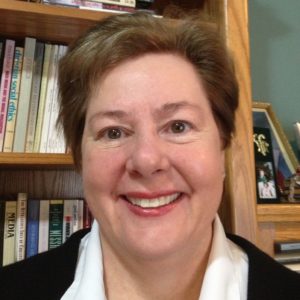 Geri E. Forsberg (PhD, New York University) has served with Cru (Campus Crusade for Christ) since 1975. Currently, Geri is a faculty fellow with Faculty Commons (Cru) and serves on the English Department faculty at Western Washington University. She serves on the board of directors for the International Jacques Ellul Society, the editorial board of New Explorations: Studies in Culture and Communication (NExJ) and Second Nature, an online journal for critical thinking about technology and new media in light of the Christian tradition. Her more recent writings have focused on the relationship between the faith of our communication founders and communication studies. Connect with Geri here: https://chss.wwu.edu/english/forsbeg
Geri E. Forsberg (PhD, New York University) has served with Cru (Campus Crusade for Christ) since 1975. Currently, Geri is a faculty fellow with Faculty Commons (Cru) and serves on the English Department faculty at Western Washington University. She serves on the board of directors for the International Jacques Ellul Society, the editorial board of New Explorations: Studies in Culture and Communication (NExJ) and Second Nature, an online journal for critical thinking about technology and new media in light of the Christian tradition. Her more recent writings have focused on the relationship between the faith of our communication founders and communication studies. Connect with Geri here: https://chss.wwu.edu/english/forsbeg
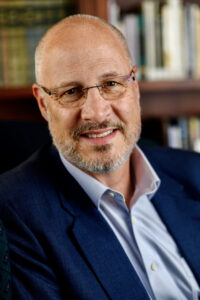 Stan Wallace (DMin, Talbot School of Theology) is the President and CEO of Global Scholars, an academic ministry equipping Christian professors to be the “aroma of Christ” (2 Cor 2:15) in higher education worldwide. He is also a Co-Catalyst for the Lausanne Movement’s Academic Ministry and Educators Network and is on the board of Apologetics on Mission. Stan has done doctoral studies in philosophy at Marquette University and holds a Doctor of Ministry from Talbot School of Theology. He has published in academic and ministry journals, contributed to several books, edited several others, produces two monthly podcasts: College Faith and Thinking Christianly, and is the author of Have We Lost Our Minds? Neuroscience, Neurotheology, the Soul, and Human Flourishing (forthcoming). Connect with Stan here: https://stanwallace.org/
Stan Wallace (DMin, Talbot School of Theology) is the President and CEO of Global Scholars, an academic ministry equipping Christian professors to be the “aroma of Christ” (2 Cor 2:15) in higher education worldwide. He is also a Co-Catalyst for the Lausanne Movement’s Academic Ministry and Educators Network and is on the board of Apologetics on Mission. Stan has done doctoral studies in philosophy at Marquette University and holds a Doctor of Ministry from Talbot School of Theology. He has published in academic and ministry journals, contributed to several books, edited several others, produces two monthly podcasts: College Faith and Thinking Christianly, and is the author of Have We Lost Our Minds? Neuroscience, Neurotheology, the Soul, and Human Flourishing (forthcoming). Connect with Stan here: https://stanwallace.org/
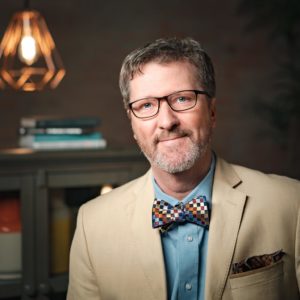 Robert H. Woods Jr. (PhD, Regent University) served as Professor of Communication and Media at Spring Arbor University for 20 years. He currently serves as the Executive Director of the Christianity and Communication Studies Network (CCSN) (www.theccsn.com), a non-profit network providing resources and training on faith-learning integration in the field of communication studies. He is the editor-in-chief of the CCSN’s imprint, Integratio Press. Dr. Woods has served as the President of the Religious Communication Association (RCA) and was named Scholar of the Year by RCA. He is the recipient of multiple research and scholarship awards and the editor/author of over a dozen books. Most recently, Dr. Woods is the co-author with Paul Patton on Everyday Sabbath: How to Lead Your Dance with Media and Technology in Mindful and Sacred Ways and Professing Christ: Christian Tradition and Faith-learning Integration in Public Universities. His book co-authored with Kevin Healey (University of New Hampshire), titled Ethics and Religion in the Age of Social Media: Digital Proverbs for Responsible Citizens received the Book of the Year Award from RCA. Connect with Robert: www.roberthwoodsjr.com.
Robert H. Woods Jr. (PhD, Regent University) served as Professor of Communication and Media at Spring Arbor University for 20 years. He currently serves as the Executive Director of the Christianity and Communication Studies Network (CCSN) (www.theccsn.com), a non-profit network providing resources and training on faith-learning integration in the field of communication studies. He is the editor-in-chief of the CCSN’s imprint, Integratio Press. Dr. Woods has served as the President of the Religious Communication Association (RCA) and was named Scholar of the Year by RCA. He is the recipient of multiple research and scholarship awards and the editor/author of over a dozen books. Most recently, Dr. Woods is the co-author with Paul Patton on Everyday Sabbath: How to Lead Your Dance with Media and Technology in Mindful and Sacred Ways and Professing Christ: Christian Tradition and Faith-learning Integration in Public Universities. His book co-authored with Kevin Healey (University of New Hampshire), titled Ethics and Religion in the Age of Social Media: Digital Proverbs for Responsible Citizens received the Book of the Year Award from RCA. Connect with Robert: www.roberthwoodsjr.com.
Registration Fee: $50.00

